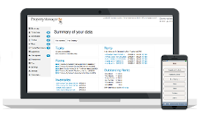Record keeping for the tax man.
What's a record. Well, it's a big black thing with a hole in the middle.
What?, sorry !, wrong kind of record. I wondered why I had to keep his, when I've got enough to do.
Any way, back to the subject.
Unless I'm mistaken you are investing in property to make a profit and as a consequence if you are successful you'll make more than if you put your money in a bank or building society.
The downside of making a profit is that you'll have to pay taxes on the extra income. The one that galls most people is the payment of Capital Gains Tax. Briefly, is where you pay tax on the profit you make when selling a property other than your main residence.
To ensure you keep your 'gains' to the minimum, you can off-set some expenditure against your 'profits'. There are a number of allowances and we will go into these at length in the future, but it all starts with record keeping. Even though you may have an excellent accountant, he has to have something to work with, so it's important you start keeping records of all transactions from day one. This will not only help him get your accounts correct, it will also save you money. Because if your accountant also has to get together all stubs, receipts and contracts for you, he is going to add that to your bill.
So, what kind of records?
i/ Contracts for the purchase or sale, lease or exchange of the property.
ii/ Any documentation that describes properties you acquired but did not buy yourself, for example a gift or inheritance.
iii/ Details of any property that you have given away or put into trust
iv/ Copies of any valuations taken into account in your calculations of gains or losses,
v/ Bills, invoices or other evidence of payment records such as bank statements and cheque stubs for costs you claim for the purchase, improvement or sale of the property.
vi/ Correspondence with buyers and sellers leading up to the sale of the property.
I know all this seems pretty obvious, but I'm always surprised at what people don't keep when I'm asked for advice. My advice is; keep everything, even if it means paying someone a small storage charge if you don't have the space. Your accountant should be able to help out with that aspect.
If you need advice on any subject connected with CGT , sorry, I can't take calls, but will be happy to help via email on helpdesk@taxrefund money.co.uk or through the forum.








No comments:
Post a Comment